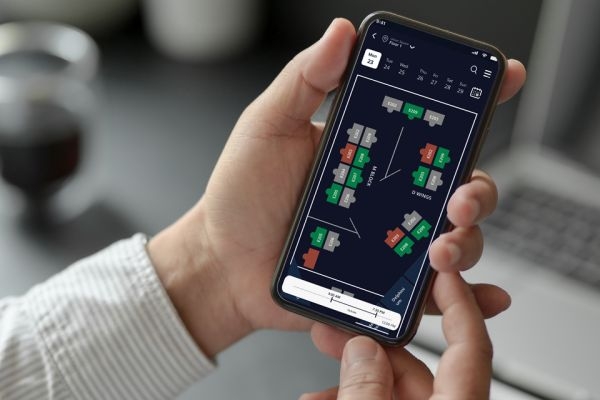Smart offices get smarter with rise of hybrid work

AT Schneider Electric's regional headquarters in Kallang, over a thousand sensors across nine floors track the occupancy of workstations and meeting rooms in real-time. This helps the company plan its office layout according to usage patterns.
As safety measures kicked in during the pandemic, Schneider Electric used this technology to track the number of occupants within the premises to ensure safe distancing. Staff with flexible working arrangements could find available workspaces and check for colleagues in the building through a mobile application (app).
"We see this as the workplace of the future," said Kim Yoon Young, the company's cluster president for Singapore, Malaysia and Brunei.
More companies are shifting towards a hybrid model of working, sparking an uptick in demand for workspace technologies that help facilitate everything from desk booking to analysis of space utilisation.
Smarten Spaces, a Singapore-based global provider of digital solutions for workplaces, saw a 170 per cent increase in clients from the start of 2020 to March this year. The startup's solutions have been deployed in 17 countries across more than 70 cities.
Features that rose in popularity at the start of the pandemic include contactless check-in using mobile phones and real-time updates on office sanitisation.
Even before the pandemic, Singapore companies appeared well ahead of those in other countries in adopting workplace technologies.
A 2019 study by London-headquartered office software firm Condeco found that almost three-quarters of respondents in Singapore had offices with smart building and office measures, compared with around half of respondents globally.
This was likely accelerated by the Republic's Smart Nation initiative, Condeco said then.
But as the traditional office model gets upended, business leaders are racking their brains over how to maintain flexible working arrangements while keeping their company culture and creativity intact.
"Clients are asking, 'How do I design an office that can increase my employee engagement and make an impact on my business? How can I create a work environment for higher employee retention and increase productivity?'" said Arsh Chaudhry, chief executive of corporate interior design firm Space Matrix.
Some are turning to technology. Financial institutions, technology companies and pharmaceutical groups are among those leading the charge, industry players said.
DBS, which is allowing its 29,000 employees to work remotely up to 40 per cent of the time, has launched two hubs spanning a total of 9,300 square feet to experiment with hybrid work solutions.
The bank declined to reveal specific technology that it was testing out, but said that it aimed to blend the best of physical and virtual workspace configurations. It also wants "to ensure that all employees have an equal share of voice in meetings, which will help foster greater agility and collaboration across the bank", a spokesperson said.
US tech companies such as Facebook and Microsoft - some of the earliest to embrace hybrid working - are exploring virtual reality and mixed reality tools.
Smarten Space's chief executive Dinesh Malkani said technology can help bridge employees by "matching the right people at the right place, at the right time".
If an important project requires staff from different departments to collaborate for a few weeks, Smarten Spaces' platform allows them to book a cluster of hot desks for that period. In contrast, traditional office layouts separate people by departments.
With visibility on who is going into the office and on what days, the human resources team can plan events that tailor to attendance, Mr Malkani added.
Data on employee activities and office utilisation is becoming more valuable to companies wanting to maximise the use of workplaces.
"Benchmarking that data against offices of companies in other geographies (and) other competitors is going to be very important for making strategic decisions on behalf of clients," said Space Matrix's Mr Chaudhry.
Such data can drive decisions on whether to downsize offices, and by how much. Companies such as DBS and ANZ are reportedly trimming office space in Singapore.
More might follow. "In our conversations with employers, we found out that some of them have given up their office space, or at least partially, in this new normal," said Andrew Tan, Singapore country manager for recruitment firm Wantedly.
Yet, hybrid work is paving the way for new real estate models enabled by technology. Proptech company REInvent, which is backed by JustCo, launched a workspace-on-demand platform called Switch last year.
With over 3,500 desks, meeting rooms and private offices at more than 40 locations across Singapore, workers can pop into a workspace at their convenience and pay as they use.
One company was able to reduce their traditional office space from three floors to one floor after using the Switch enterprise account, said Dominic Penaloza, chief executive and co-founder of REInvent.
Landlords are also looking at how to use technology to spice up their office buildings and attract workers to come in. That way, companies might want to continue leasing space.
Real estate tech company Habitap, whose portfolio includes Marina Bay Financial Centre and One Raffles Quay, is in discussion with landlords on initiatives including facilitating the order and collection of food from nearby eateries via an app, and setting up parcel lockers for deliveries.
Compared with before the pandemic, less effort has to be spent on educating landlords on the advantages of adopting technology, said Habitap CEO Franklin Tang. "This one year basically put us all into a technology boot camp."




